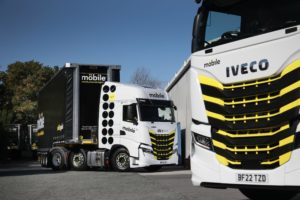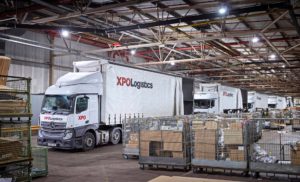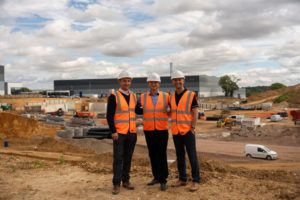
One way they can prove to customers that they are operating sustainably is through the concept of carbon neutrality, which requires cutting overall business and supply chain CO2 emissions to zero – and there are a number of ways in which forward-thinking businesses are working to achieve that goal.
Earlier this year, Birmingham-based Mobile People Powered Logistics was certified as a Carbon Neutral Business under the UN’s internationally recognised calculation ISO 14064.
The company first started its journey to carbon neutrality last year, a process that was completed at the end of March 2023 through its partnership with Carbon Neutral Britain, a UK offsetting programme.
This allows Mobile PPL to offset its environmental impact by investing in projects to remove carbon dioxide and greenhouse gases from the atmosphere.
Mobile PPL is using this milestone to cement its ambition to become a Zero Emissions business by 2037.
As part of its Environmental Pledge, Mobile PPL will report its emissions data to show its progress and areas for improvement. It will also dedicate time and resource to researching sustainable technologies and update its procurement process to make sustainability one of its key purchase motivators.
In addition, the company says it will be open and transparent about the environmental challenges the industry faces, and encourage its suppliers, partners and peers to join it.
“The process of becoming Carbon Neutral has been a challenge, given the margins that we operate at,” said Matthew Marriott, Managing Director of Mobile PPL, which has a team of more than 120 people and 60 owned vehicles. “However, we felt it was important to make a stance and let our actions do the talking.
“We wanted to fund this ourselves, not by dressing it up as a ‘green tax’ passed onto clients, in the hope that our position on this issue will motivate and inspire others to join us.”
Meanwhile, XPO Logistics has achieved carbon neutral status for its 350,000 sq ft Crick centre in Northamptonshire, its headquarters and national distribution hub for the UK and Ireland.
The company was awarded this status by Carbon Neutral Britain in June this year, after reducing its site emissions before offsetting the final 1,124 tons of CO2e.
Its original target for reaching this status had been December this year.
XPO reduced emissions from the Crick site in several ways, such as switching to Tier 1 energy supply – including wind, solar, and hydro.
The company also replaced all lighting in its offices and the warehouse with LEDs, while implementing measures to reduce water demand and consumption across the site.
XPO also worked with a contractor to achieve zero waste to landfill, along with increased segregation of waste streams to boost the amount that is recycled.
In addition, it implemented an internal reuse initiative for scrap packaging in its high bay operations, including materials such as wood, metal, and high-grade card.
Also, XPO now segregates packaging waste to optimise rebates before re-investing this in other initiatives on site.
As part of its future plans, the company aims to expand use of its own renewable energy resources to boost energy generating capacity and battery storage solutions, commitments that will accelerate its journey to achieving carbon neutrality.

“Still, we are not resting on our laurels. We know there is more to do, and we need to do it faster, working with our outstanding team. I am confident we will achieve carbon neutrality in additional company sites this year.”
Energy logistics provider Peterson Energy Logistics recently launched a new consultancy service to support companies with their carbon neutral status certifications and net zero journeys.
The consultancy service is designed to support clients with proven methodologies, a purpose-built carbon data collection tool, and Business Intelligence dashboards that deliver significant cost savings and efficiencies during the carbon-neutral certification process.
Peterson’s digital consultancy Core29 has also developed a bespoke software solution to accelerate the data collection process for Scope 1, 2 and 3 emissions, which reduces the hours required to measure emissions by about 40% during and after the carbon neutral process is complete.
The company achieved carbon-neutral status at the end of 2022 under the PAS 2060 accreditation covering 34 sites across seven countries.
It also plans to reach net zero operations by 2025, as part of its sustainability roadmap.
In addition, Peterson was recently awarded a five-year logistics contract to support Harbour Energy’s North Sea operations from Aberdeen, that will see it deliver a range of carbon neutral logistics services.
These include quayside vessel loading, road transport, materials receipt and dispatch, and warehousing services.
Sarah Moore, Chief Executive of Peterson, said: “We are delighted to offer this new consultancy service to companies committed to taking the first step to reducing their carbon footprint and playing their part in the energy transition.
“Our sustainability team is looking forward to sharing their wealth of knowledge and practical experience with clients to significantly accelerate their carbon-neutral certification and achieve their sustainability targets.”
Suffolk Port One Logistics Park is a new strategic development located close to Ipswich and Felixstowe Port, benefitting from direct access to Junction 52 of the A14.
The business made a commitment that all its new B8 warehouses be carbon neutral from May 2023, making it East Anglia’s first carbon-neutral logistics park.
For example, family-run Hemisphere Freight Services is currently building a new 243,511 sq ft warehouse at Port One.
The facility will feature PV solar panel roofing which will supply the warehouse needs for high-speed car charging, office lighting, fork truck operation, and the business aims to generate enough energy to put some back into the grid.

It is certain that many others in the industry will follow the example of these businesses, and develop their own carbon neutral logistics plans in the future.








